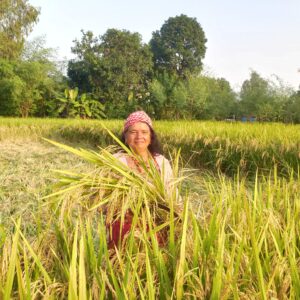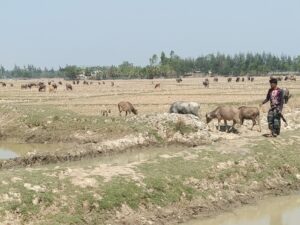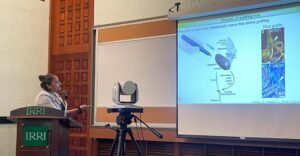Farmers in Tamil Nadu can increase their profits by USD67 per hectare while using lesser fertilizer through the Nutrient Manager for Rice (NMR) technology. NMR is a decision tool for nutrient management guidelines for rice
developed by the International Rice Research Institute (IRRI) and is based on the principles of site-specific nutrient management (SSNM) technology. It provides fertilizer guidelines matching the field-specific needs and conditions of the farmer. This is one of the highlights reported by IRRI scientist P.Panneerselvam at the CSISA Tamil Nadu Hub Celebration Workshop on 15-16 September held in Thanjavur.
With the use of NMR, farmers can save 15–20% of nitrogen, 36–42% of phosphorous, and 28% of potassium compared with state fertilizer recommendation; and 33–42% phosphorous and 30% potassium compared with farmer’s practice. These were the results from an on-farm participatory research done from 2013 to 2015 in Thanjavur, Thiruvarur, and Nagapattinam districts in Tamil Nadu.
“However, fine tuning of the recommendations is going on with state institutions along with their confirmation of the recommendations. These are steps that will need to continue beyond the current project,” said Dr. Noel Magor, head of the Impact Acceleration Unit and Training at IRRI.
In addition, the NMR technology can reduce fertilizer use by 24,000 tons in the Cauvery Delta and cut the costs of fertilizers by 930–2,500 million rupees.
“Fertilizers are typically the second largest input cost in rice production,” said Panneerselvam. “Thus, NMR is a welcome technology in Tamil Nadu.”
Moreover, the use of the NMR technology is seen as a huge potential because the Tamil Nadu government has recently announced that all rural households would be provided with low-cost internet connectivity. This will increase the number of farmers and rural youths who will be using the internet for agriculture.
India has an imminent need to increase its rice production. The country’s demand will be 120 million tons by 2030 in order to feed a population of 1.5 billion. Presently, its rice production is 104 million from 44 million hectares of rice area.
“The Cauvery Delta contributes a substantial share to the state’s rice production,” said Panneerselvam. “Tamil Nadu, which is a major rice-producing states in India, has 1.9 million hectares of rice area. Thus, helping farmers in Tamil Nadu will have an impact on the overall production of the country.”
Learn more about IRRI (www.irri.org) or follow us on the social media and networks (all links down the right column).










